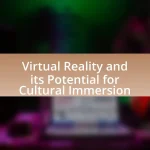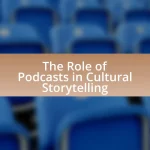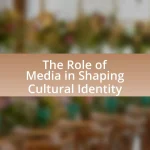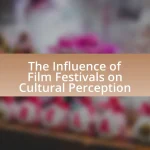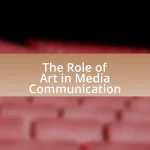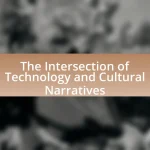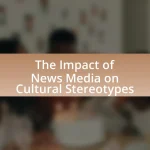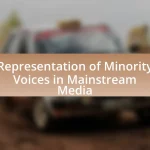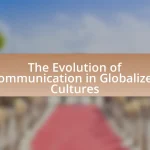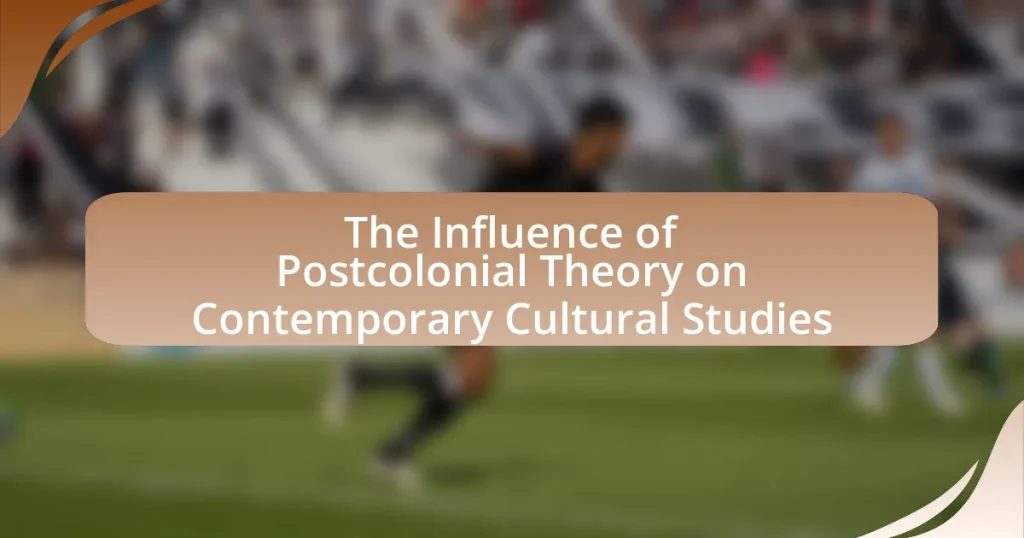Postcolonial Theory plays a crucial role in shaping contemporary cultural studies by challenging dominant narratives and emphasizing the complexities of identity, power, and representation in a globalized world. This article explores the emergence of Postcolonial Theory as a significant framework, its historical contexts, and key theorists such as Edward Said and Homi K. Bhabha. It examines core principles, critiques, and methodologies associated with the theory, highlighting its influence on cultural analysis and the understanding of cultural texts. Additionally, the article discusses future directions for Postcolonial Theory, including the integration of intersectionality and the impact of globalization on cultural studies.
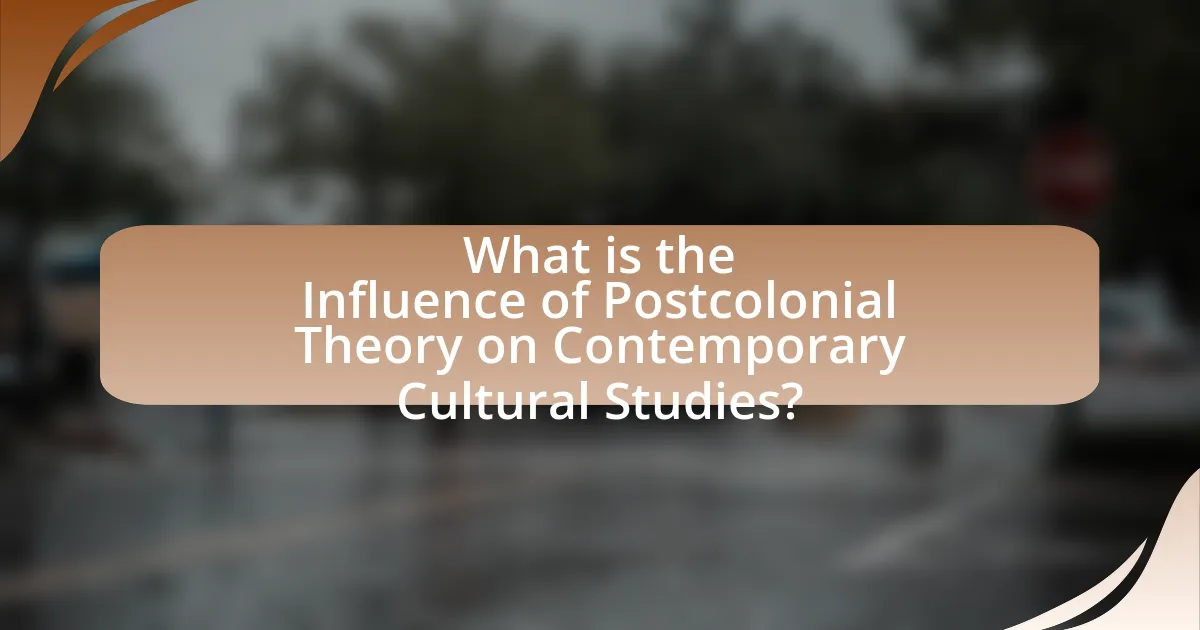
What is the Influence of Postcolonial Theory on Contemporary Cultural Studies?
Postcolonial theory significantly influences contemporary cultural studies by challenging dominant narratives and highlighting the complexities of identity, power, and representation in a globalized context. This theoretical framework critiques colonial legacies and emphasizes the voices and experiences of marginalized groups, thereby reshaping cultural analysis. For instance, scholars like Homi K. Bhabha and Edward Said have introduced concepts such as hybridity and Orientalism, which encourage a reevaluation of cultural texts and practices through the lens of colonial histories. This shift has led to a more nuanced understanding of cultural interactions and the dynamics of power, making postcolonial theory essential for analyzing contemporary cultural phenomena.
How did Postcolonial Theory emerge as a significant framework?
Postcolonial Theory emerged as a significant framework in response to the cultural, political, and economic impacts of colonialism and imperialism. This theoretical approach gained prominence in the mid-20th century, particularly after World War II, as newly independent nations sought to articulate their identities and experiences in the aftermath of colonial rule. Scholars such as Edward Said, with his seminal work “Orientalism” published in 1978, critically examined how Western representations of the East shaped cultural perceptions and power dynamics. This analysis highlighted the need for a framework that addressed the complexities of identity, power, and resistance in postcolonial contexts, thereby establishing Postcolonial Theory as a vital lens through which to understand contemporary cultural studies.
What historical contexts contributed to the development of Postcolonial Theory?
The historical contexts that contributed to the development of Postcolonial Theory include the decline of colonial empires, the rise of independence movements, and the impact of globalization. The decline of colonial empires, particularly after World War II, led to the emergence of newly independent nations that sought to redefine their identities and cultural narratives. Independence movements across Africa, Asia, and the Caribbean challenged colonial ideologies and emphasized the importance of local histories and experiences. Additionally, the processes of globalization in the late 20th century facilitated cross-cultural exchanges and highlighted the complexities of identity in a postcolonial world. These contexts collectively shaped Postcolonial Theory, which critically examines the legacies of colonialism and their ongoing effects on culture and society.
Who are the key theorists associated with Postcolonial Theory?
Key theorists associated with Postcolonial Theory include Edward Said, Homi K. Bhabha, and Gayatri Chakravorty Spivak. Edward Said’s seminal work, “Orientalism,” critiques Western representations of the East and establishes foundational concepts in postcolonial discourse. Homi K. Bhabha introduces ideas such as hybridity and the “third space,” which explore cultural interactions and identity formation. Gayatri Chakravorty Spivak’s influential essay “Can the Subaltern Speak?” addresses issues of voice and representation in postcolonial contexts. These theorists significantly shape the framework and discussions within contemporary cultural studies.
What are the core principles of Postcolonial Theory?
The core principles of Postcolonial Theory include the critique of colonialism, the examination of cultural identity, and the analysis of power dynamics between colonizers and the colonized. This theory emphasizes the lasting impacts of colonial rule on former colonies, highlighting how cultural narratives and identities are shaped by historical contexts. It also explores the concept of hybridity, which refers to the blending of cultures resulting from colonial encounters, and the idea of subalternity, focusing on voices and perspectives marginalized by dominant narratives. These principles are supported by the works of scholars such as Edward Said, whose book “Orientalism” critiques Western representations of the East, and Homi K. Bhabha, who discusses cultural hybridity and the ambivalence of colonial discourse.
How does Postcolonial Theory address issues of identity and representation?
Postcolonial Theory addresses issues of identity and representation by critically examining how colonial histories shape cultural identities and power dynamics in postcolonial societies. This theory highlights the complexities of identity formation, emphasizing that identities are not fixed but are influenced by historical contexts, cultural exchanges, and ongoing power relations. For instance, scholars like Homi K. Bhabha argue that hybrid identities emerge from the interaction between colonizers and the colonized, challenging essentialist notions of identity. Additionally, Edward Said’s concept of “Orientalism” illustrates how Western representations of the East have constructed and distorted identities, reinforcing stereotypes and power imbalances. These frameworks demonstrate that Postcolonial Theory is essential for understanding the multifaceted nature of identity and representation in a globalized world.
What role does power dynamics play in Postcolonial Theory?
Power dynamics are central to Postcolonial Theory as they examine the relationships of dominance and subordination established during and after colonial rule. This theory critiques how colonial powers exerted control over colonized societies, shaping cultural, political, and economic structures. For instance, Edward Said’s concept of Orientalism illustrates how Western narratives constructed the East as inferior, reinforcing power imbalances. Additionally, postcolonial scholars like Homi K. Bhabha emphasize hybridity and the negotiation of identities, highlighting how power dynamics influence cultural exchanges and resistance. Thus, understanding power dynamics is essential for analyzing the ongoing effects of colonialism in contemporary cultural studies.
How has Postcolonial Theory influenced contemporary cultural studies?
Postcolonial Theory has significantly influenced contemporary cultural studies by providing critical frameworks for analyzing power dynamics, identity, and representation in postcolonial contexts. This theoretical approach challenges Eurocentric narratives and emphasizes the importance of local voices and experiences, thereby reshaping how cultural texts are interpreted. For instance, scholars like Homi K. Bhabha and Edward Said have introduced concepts such as hybridity and Orientalism, which have become foundational in examining cultural interactions and the effects of colonial histories on contemporary societies. These frameworks enable cultural studies to address issues of globalization, migration, and cultural identity, making it more relevant in a diverse and interconnected world.
What methodologies have been adopted from Postcolonial Theory in cultural studies?
Methodologies adopted from Postcolonial Theory in cultural studies include deconstruction, hybridity, and intertextuality. Deconstruction allows scholars to analyze texts by revealing underlying power dynamics and assumptions, as seen in Edward Said’s “Orientalism,” which critiques Western representations of the East. Hybridity, a concept popularized by Homi K. Bhabha, examines the blending of cultures and identities, highlighting the complexities of postcolonial identities. Intertextuality, as discussed by Julia Kristeva, emphasizes the interconnectedness of texts and cultural narratives, enabling a deeper understanding of cultural exchanges and influences. These methodologies facilitate critical engagement with cultural artifacts and contribute to a nuanced understanding of identity, power, and representation in postcolonial contexts.
How does Postcolonial Theory reshape the understanding of cultural texts?
Postcolonial Theory reshapes the understanding of cultural texts by emphasizing the impact of colonial histories and power dynamics on cultural production and interpretation. This theoretical framework critiques Eurocentric narratives, highlighting the voices and experiences of marginalized cultures, thereby allowing for a more nuanced analysis of texts. For instance, scholars like Edward Said in “Orientalism” illustrate how Western representations of the East are constructed through a lens of power and domination, which alters the perception of cultural texts. By foregrounding issues of identity, hybridity, and resistance, Postcolonial Theory enables a reevaluation of cultural texts, revealing underlying ideologies and fostering a deeper comprehension of their socio-political contexts.
What are the critiques of Postcolonial Theory within cultural studies?
Critiques of Postcolonial Theory within cultural studies include its perceived Eurocentrism, oversimplification of complex identities, and neglect of economic factors. Scholars argue that Postcolonial Theory often prioritizes Western narratives and frameworks, which can marginalize non-Western perspectives. Additionally, critics highlight that the theory tends to generalize the experiences of colonized peoples, failing to account for the diversity of identities and experiences shaped by colonialism. Furthermore, some argue that Postcolonial Theory inadequately addresses the role of capitalism and globalization in shaping postcolonial societies, thus limiting its analytical scope. These critiques underscore the need for a more nuanced approach that incorporates multiple perspectives and factors influencing postcolonial contexts.
What limitations have scholars identified in Postcolonial Theory?
Scholars have identified several limitations in Postcolonial Theory, including its tendency to oversimplify complex cultural dynamics and its focus on binary oppositions, such as colonizer versus colonized. This reductionist approach often neglects the nuances of identity, power relations, and the internal diversities within postcolonial societies. Additionally, critics argue that Postcolonial Theory can be Eurocentric, as it sometimes prioritizes Western frameworks and perspectives over indigenous voices and experiences. Furthermore, the theory has been criticized for its insufficient engagement with contemporary global issues, such as globalization and transnationalism, which require a more intersectional and fluid understanding of cultural interactions. These limitations highlight the need for a more comprehensive and inclusive approach to analyzing postcolonial contexts.
How do alternative theories challenge Postcolonial perspectives?
Alternative theories challenge Postcolonial perspectives by critiquing the binary oppositions and essentialist identities that Postcolonial theory often relies on. For instance, feminist and queer theories argue that Postcolonialism can overlook the complexities of gender and sexuality, thereby simplifying the experiences of marginalized groups. Additionally, Marxist critiques emphasize the economic dimensions of colonialism, suggesting that Postcolonial theory may neglect class struggles and material conditions. These alternative frameworks highlight the need for a more nuanced understanding of power dynamics, identity, and resistance, thereby enriching the discourse surrounding colonial legacies and contemporary cultural studies.
How can Postcolonial Theory be applied in contemporary cultural analysis?
Postcolonial Theory can be applied in contemporary cultural analysis by examining the power dynamics and cultural narratives that emerge from colonial histories. This theoretical framework allows scholars to critique how colonial legacies shape identity, representation, and cultural production in postcolonial societies. For instance, Edward Said’s concept of “Orientalism” illustrates how Western representations of the East perpetuate stereotypes and reinforce power imbalances, which can be analyzed in modern media and literature. Additionally, Homi K. Bhabha’s ideas on hybridity and cultural negotiation provide insights into how cultures interact and transform in a globalized world, highlighting the complexities of identity formation. These applications demonstrate that Postcolonial Theory is essential for understanding contemporary cultural phenomena and the ongoing impact of colonialism on global cultural exchanges.
What case studies exemplify the application of Postcolonial Theory in cultural studies?
Case studies that exemplify the application of Postcolonial Theory in cultural studies include Edward Said’s analysis of Orientalism, which critiques Western representations of the East, and Homi K. Bhabha’s concept of hybridity, explored in his work “The Location of Culture,” which examines cultural identity in postcolonial contexts. These studies demonstrate how Postcolonial Theory interrogates power dynamics, cultural representation, and identity formation in a globalized world.
How can researchers effectively integrate Postcolonial Theory into their work?
Researchers can effectively integrate Postcolonial Theory into their work by critically analyzing texts and cultural artifacts through the lens of colonial histories and power dynamics. This involves examining how colonial legacies shape contemporary identities, narratives, and cultural practices. For instance, scholars can utilize Edward Said’s concept of Orientalism to deconstruct Western representations of the East, revealing underlying biases and assumptions. Additionally, incorporating voices from formerly colonized regions in research can provide a more nuanced understanding of cultural interactions and resistances. This approach is supported by the work of Homi K. Bhabha, who emphasizes the importance of hybridity and the complexities of cultural exchange. By applying these theoretical frameworks, researchers can uncover the multifaceted impacts of colonialism on current cultural phenomena.
What future directions can be anticipated for Postcolonial Theory in cultural studies?
Future directions for Postcolonial Theory in cultural studies include a deeper integration of intersectionality, focusing on how race, gender, and class intersect within postcolonial contexts. This evolution is driven by the recognition that traditional postcolonial frameworks often overlook these complexities, as highlighted by scholars like Kimberlé Crenshaw, who emphasizes the importance of understanding overlapping social identities. Additionally, the rise of digital humanities is anticipated to reshape postcolonial studies, allowing for new methodologies that analyze cultural texts and practices in a globalized digital landscape. This shift is supported by the increasing availability of digital archives and platforms that facilitate cross-cultural dialogues, as noted in the work of scholars such as Roio and Rojas. Furthermore, there is an expected emphasis on environmental concerns within postcolonial discourse, addressing how colonial histories impact contemporary ecological crises, as discussed by authors like Dipesh Chakrabarty. These anticipated directions reflect a dynamic and evolving field that continues to respond to contemporary global challenges.
How might Postcolonial Theory evolve in response to global cultural shifts?
Postcolonial Theory may evolve by integrating new perspectives that address the complexities of globalization and transnationalism. As global cultural shifts occur, such as increased migration and digital communication, Postcolonial Theory can adapt by examining how these factors influence identity, power dynamics, and cultural exchange. For instance, the rise of hybrid identities in multicultural societies challenges traditional notions of fixed cultural boundaries, prompting scholars to rethink concepts like hybridity and diaspora. Additionally, the impact of social media on cultural representation necessitates a reevaluation of how postcolonial narratives are constructed and disseminated. This evolution is supported by the growing body of literature that explores the intersections of postcolonialism with globalization, such as Homi K. Bhabha’s work on cultural hybridity and Arjun Appadurai’s theories on global cultural flows.
What emerging trends in cultural studies are influenced by Postcolonial Theory?
Emerging trends in cultural studies influenced by Postcolonial Theory include the examination of hybridity, transnationalism, and the critique of globalization. Hybridity explores the blending of cultures and identities resulting from colonial histories, as seen in the works of Homi K. Bhabha, who argues that cultural interactions create new, hybrid identities. Transnationalism focuses on the movement of people and ideas across borders, highlighting how diasporic communities shape cultural narratives, as discussed by scholars like Arjun Appadurai. Additionally, the critique of globalization addresses the power dynamics and cultural imperialism that arise from global exchanges, emphasizing the need for a more equitable representation of marginalized voices in cultural discourse. These trends reflect a shift towards understanding culture as fluid and interconnected, challenging traditional notions of identity and belonging.
What practical strategies can enhance the study of Postcolonial Theory in cultural contexts?
Practical strategies to enhance the study of Postcolonial Theory in cultural contexts include interdisciplinary approaches, critical engagement with primary texts, and the incorporation of diverse cultural perspectives. Interdisciplinary approaches allow scholars to draw insights from fields such as history, sociology, and anthropology, enriching the analysis of postcolonial narratives. Critical engagement with primary texts, including literature, film, and art from postcolonial societies, fosters a deeper understanding of the lived experiences and cultural expressions shaped by colonial histories. Incorporating diverse cultural perspectives ensures that the study reflects a multiplicity of voices, particularly those of marginalized communities, which is essential for a comprehensive understanding of postcolonial dynamics. These strategies collectively contribute to a more nuanced and informed exploration of Postcolonial Theory within cultural contexts.
